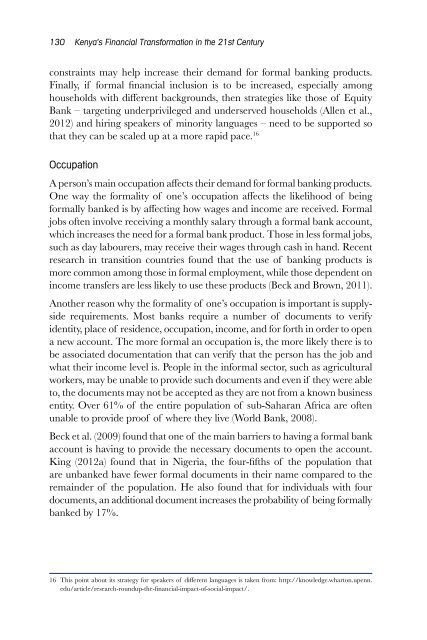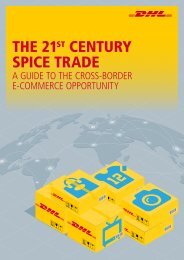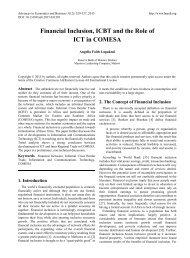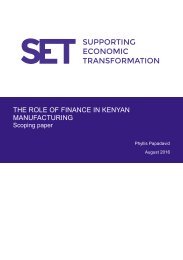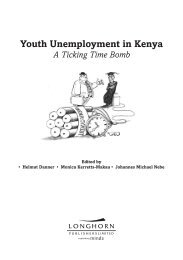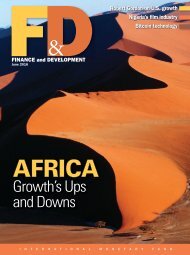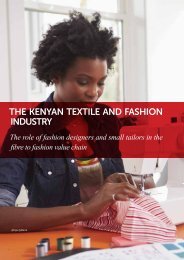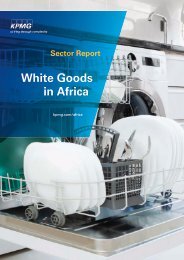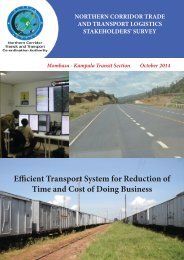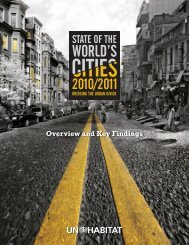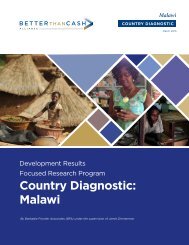in the 21st Century
hTOE305aYVW
hTOE305aYVW
Create successful ePaper yourself
Turn your PDF publications into a flip-book with our unique Google optimized e-Paper software.
130 Kenya’s F<strong>in</strong>ancial Transformation <strong>in</strong> <strong>the</strong> <strong>21st</strong> <strong>Century</strong><br />
constra<strong>in</strong>ts may help <strong>in</strong>crease <strong>the</strong>ir demand for formal bank<strong>in</strong>g products.<br />
F<strong>in</strong>ally, if formal f<strong>in</strong>ancial <strong>in</strong>clusion is to be <strong>in</strong>creased, especially among<br />
households with different backgrounds, <strong>the</strong>n strategies like those of Equity<br />
Bank – target<strong>in</strong>g underprivileged and underserved households (Allen et al.,<br />
2012) and hir<strong>in</strong>g speakers of m<strong>in</strong>ority languages – need to be supported so<br />
that <strong>the</strong>y can be scaled up at a more rapid pace. 16<br />
Occupation<br />
A person’s ma<strong>in</strong> occupation affects <strong>the</strong>ir demand for formal bank<strong>in</strong>g products.<br />
One way <strong>the</strong> formality of one’s occupation affects <strong>the</strong> likelihood of be<strong>in</strong>g<br />
formally banked is by affect<strong>in</strong>g how wages and <strong>in</strong>come are received. Formal<br />
jobs often <strong>in</strong>volve receiv<strong>in</strong>g a monthly salary through a formal bank account,<br />
which <strong>in</strong>creases <strong>the</strong> need for a formal bank product. Those <strong>in</strong> less formal jobs,<br />
such as day labourers, may receive <strong>the</strong>ir wages through cash <strong>in</strong> hand. Recent<br />
research <strong>in</strong> transition countries found that <strong>the</strong> use of bank<strong>in</strong>g products is<br />
more common among those <strong>in</strong> formal employment, while those dependent on<br />
<strong>in</strong>come transfers are less likely to use <strong>the</strong>se products (Beck and Brown, 2011).<br />
Ano<strong>the</strong>r reason why <strong>the</strong> formality of one’s occupation is important is supplyside<br />
requirements. Most banks require a number of documents to verify<br />
identity, place of residence, occupation, <strong>in</strong>come, and for forth <strong>in</strong> order to open<br />
a new account. The more formal an occupation is, <strong>the</strong> more likely <strong>the</strong>re is to<br />
be associated documentation that can verify that <strong>the</strong> person has <strong>the</strong> job and<br />
what <strong>the</strong>ir <strong>in</strong>come level is. People <strong>in</strong> <strong>the</strong> <strong>in</strong>formal sector, such as agricultural<br />
workers, may be unable to provide such documents and even if <strong>the</strong>y were able<br />
to, <strong>the</strong> documents may not be accepted as <strong>the</strong>y are not from a known bus<strong>in</strong>ess<br />
entity. Over 61% of <strong>the</strong> entire population of sub-Saharan Africa are often<br />
unable to provide proof of where <strong>the</strong>y live (World Bank, 2008).<br />
Beck et al. (2009) found that one of <strong>the</strong> ma<strong>in</strong> barriers to hav<strong>in</strong>g a formal bank<br />
account is hav<strong>in</strong>g to provide <strong>the</strong> necessary documents to open <strong>the</strong> account.<br />
K<strong>in</strong>g (2012a) found that <strong>in</strong> Nigeria, <strong>the</strong> four-fifths of <strong>the</strong> population that<br />
are unbanked have fewer formal documents <strong>in</strong> <strong>the</strong>ir name compared to <strong>the</strong><br />
rema<strong>in</strong>der of <strong>the</strong> population. He also found that for <strong>in</strong>dividuals with four<br />
documents, an additional document <strong>in</strong>creases <strong>the</strong> probability of be<strong>in</strong>g formally<br />
banked by 17%.<br />
16 This po<strong>in</strong>t about its strategy for speakers of different languages is taken from: http://knowledge.wharton.upenn.<br />
edu/article/research-roundup-<strong>the</strong>-f<strong>in</strong>ancial-impact-of-social-impact/.


